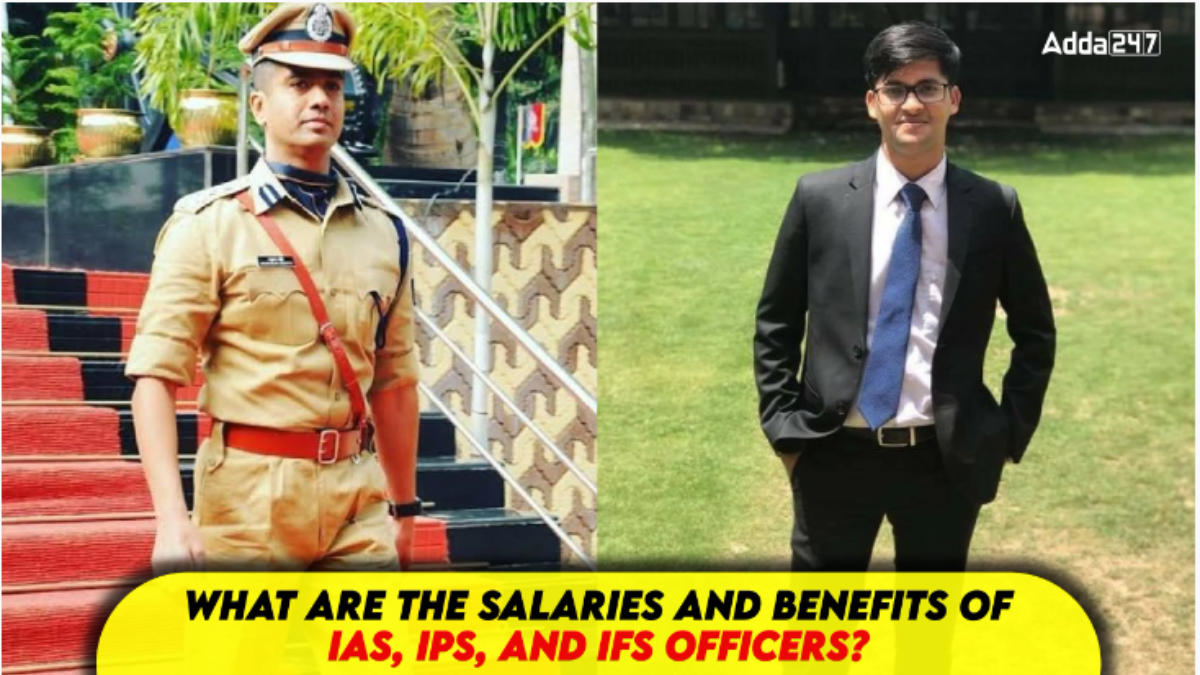Table of Contents
What is the Salary?
- After 5 to 8 years of service, the salary increases to ₹67,700.
- By the 9th year, it reaches ₹78,800.
- Upon completing 13 years, the salary rises to ₹1,18,500.
- Between 16 and 24 years of service, it becomes ₹1,44,200.
- For those with 25 to 30 years of service, the salary is ₹1,82,200.
- Finally, after 37 years of service, when officers attain the rank equivalent to Cabinet Secretary, their salary can go up to ₹2,50,000.
Benefits of Being IAS, IPS, and IFS Officers
After joining the civil services, IAS, IPS, and IFS officers enjoy several benefits through different allowances that improve their overall pay package. These allowances help cover their living and work-related expenses, making their jobs even more rewarding. Here’s a breakdown of the key benefits:
- Indian Administrative Service (IAS): IAS officers enjoy numerous benefits, including significant prestige and influence, allowing them to shape policy and decision-making at various government levels. They are provided with spacious and well-furnished government accommodation in prime locations, along with official vehicles and drivers. Additionally, they receive comprehensive healthcare benefits for themselves and their families. The role also offers a high level of job security and a stable, structured career progression.
- Indian Police Service (IPS): IPS officers enjoy several benefits, including significant authority and power to maintain law and order and manage public safety in their regions. They receive well-maintained government housing and official vehicles, along with personal security guards and domestic help. IPS officers and their families have access to quality medical facilities. Additionally, they benefit from regular opportunities for advanced training and skill development, both in India and abroad.
- Indian Foreign Service (IFS): IFS officers enjoy significant benefits, including global exposure by representing India in embassies and consulates around the world. They are provided with well-furnished housing in foreign locations, substantial foreign allowances, travel benefits, and other perks specific to international postings. Comprehensive health coverage is often included, with access to international medical facilities. Additionally, they have opportunities for cultural exchange, experiencing diverse cultures and environments that enhance both personal and professional growth.
Difference between IAS, IFS AND IPS
The provided table explains the key differences between IAS, IFS, and IPS officers:
| Aspect | IAS (Indian Administrative Service) | IFS (Indian Foreign Service) |
IPS (Indian Police Service)
|
| Primary Role | Administration of various government policies and schemes | Diplomacy, managing India’s foreign relations |
Maintaining public order, law enforcement, and internal security
|
| Training Institute | Lal Bahadur Shastri National Academy of Administration (LBSNAA) | Sushma Swaraj Institute of Foreign Service (SSIFS) |
Sardar Vallabhbhai Patel National Police Academy (SVPNPA)
|
| Training Duration | Approximately 2 years | Approximately 3 years, including language training |
Approximately 2 years
|
| Key Responsibilities | District administration, policy implementation, revenue collection | Diplomacy, consular services, international negotiations |
Crime prevention, investigation, public safety, and counter-terrorism
|
| Career Path | District Collector, Commissioner, Secretary in state and central ministries | Ambassador, High Commissioner, Consul General, Foreign Secretary |
Superintendent of Police (SP), Deputy Inspector General (DIG), Inspector General (IG)
|
| Work Environment | Predominantly within India in various districts and ministries | Embassies and consulates around the world, Ministry of External Affairs in India |
Throughout India various law enforcement agencies and departments
|
| Recruitment Process | Through Civil Services Examination (CSE) | Through Civil Services Examination (CSE) |
Through Civil Services Examination (CSE)
|
| Focus Areas | Governance, development programs, economic policies | International relations, diplomacy, protecting national interests abroad |
Public order, criminal justice, and internal security
|
| Perks and Benefits | Official residence, vehicle, government guest house accommodations, high salary | Diplomatic immunity, international postings, allowances for foreign living |
Official residence, vehicle, risk allowances, high salary
|
| Challenges | Managing diverse administrative issues, political pressures | Adapting to different cultures, managing international crises |
High-risk situations, physical and mental stress
|
| Related Articles | |
| IAS Salary | IPS Salary |



 TSPSC Group 1 Question Paper 2024, Downl...
TSPSC Group 1 Question Paper 2024, Downl...
 TSPSC Group 1 Answer key 2024 Out, Downl...
TSPSC Group 1 Answer key 2024 Out, Downl...
 UPSC Prelims 2024 Question Paper, Downlo...
UPSC Prelims 2024 Question Paper, Downlo...
